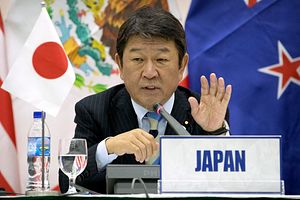Over the weekend, Japan’s new foreign minister embarked on his first Southeast Asia tour since taking office late last year. The four-country visit spotlighted Southeast Asia’s role in Japan’s foreign policy both on its own terms as well as within its own Indo-Pacific vision.
Japan’s approach to the wider Indo-Pacific rests broadly around enhancing greater connectivity, stability, and prosperity from Asia to Africa through a range of means, including improving the security situation, promoting development, and advancing rule of law and building capacity. As I have observed before in these pages, Southeast Asia plays an important role for Japan within that context as well as being important on its own terms. We have seen that continue to manifest itself over the past few years in various senses, including the economic, diplomatic, and even security realms in some instances.
This week, Southeast Asia’s role within Japan’s approach to the Indo-Pacific region is in the spotlight again with its new foreign minister making his first voyage to Southeast Asia. Japanese Foreign Minister Toshimitsu Motegi is making his first official ASEAN tour in his current position from January 5-10. Motegi’s visit, his first since assuming the foreign minister position last September, is taking place in the form of a four-country Southeast Asia tour, with stops in Vietnam, Thailand, the Philippines, and Indonesia in that order.
The trip spotlights Japan’s ongoing Indo-Pacific vision and Southeast Asia’s role within it. The four countries all individually represent what Tokyo has viewed as key Southeast Asian countries to engage with in its overall approach to the subregion. And Motegi is also expected to deliver an address at the ASEAN Secretariat in Jakarta on January 10 that will touch on Japan’s approach to the region more generally.
To be sure, as with any visit of this kind, there will be symbolism that accompanies the substance and each of the stops will be scrutinized for its share of headlines and deliverables. For instance, Motegi’s first stop in Vietnam that kicked off January 5 was scrutinized with respect to not only bilateral ties, but also regional issues such as the South China Sea — more so than usual since Vietnam is also holding the annually rotating ASEAN chairmanship in 2020. Meanwhile, the Philippines stop later in the week will put the spotlight on a relationship that has continued to see its fair share of boosts under President Rodrigo Duterte despite initial uncertainties. But as Motegi’s trip continues to takes shape over the next week, it will also be important to keep that bigger picture in mind with respect to Southeast Asia’s role in Japan’s foreign policy approach.
































